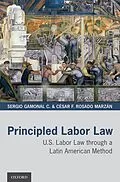The gig economy, precarious work, and nonstandard employment have forced labor law scholars to rethink their discipline. Classical remedies for unequal power, capabilities approaches, "third way" market regulation, and laissez-faire all now vie for attention - at least in English. Despite a deep history of labor activism, Latin American scholarship has had scant presence in these debates. This book introduces to an English-language audience another approach: principled labor law, based on Latin American perspectives, using a jurisprudential method focused on worker protection. The authors apply this methodology to the least likely case of labor-protective jurisprudence in the industrialized world: the United States. In doing so, Gamonal and Rosado focus on the Thirteenth Amendment as a labor-protective constitutional provision, the National Labor Relations Act, and the Fair Labor Standards Act. This book shows how principled labor law can provide a clear and simple method for consistent, labor-protective jurisprudence in the United States and beyond.
Autorentext
Sergio Gamonal C. is Professor of Law at Adolfo Ibáñez University in Chile. César F. Rosado Marzán is Associate Professor of Law and Co-Director of the Institute for Law and the Workplace at the Chicago-Kent College of Law at the Illinois Institute of Technology.
Inhalt
Introduction: A Principled Method, Even for the United States The Unlikeliest Case A Ripe Time for Principled Labor Law Can Latin America Teach Us Anything? Legal Principles: What are they? What Are They Good For? Principles in Action: A Teaser Supplementing the Labor Law Constitution A Simpler and More Coherent Alternative to Davidov's "Purposivism" Against Economism Principled Labor Law and the "Capabilities" Perspective A Necessary Counter-Cultural Narrative for the United States The Rest of this Book Chapter 1: Protection Introduction The Protective Principle in Latin America The International Aspects of Worker Protection The Protective Principle in Argentina, Brazil, Chile, and Uruguay When in Doubt, Rule in Favor of the Weaker Party: The Rule of In Dubio Pro Operario Protection in the United States: An Exercise in Legal Archeaology The Protective Principle in the Thirteenth Amendment of the U.S. Constitution Free Labor in U.S. Reconstruction and Contemporary Latin America The Protective Principle in the NLRA The Protective Principle in the FLSA What About Employment At Will? Conclusion Chapter 2: Primacy of Reality Introduction: Fact, Fiction, and Principle Primacy of Reality in Latin America Argentina Brazil Chile Uruguay Primacy of Reality in the United States Determining Employee and Employer Status The Common Law Control Test The Primary Purpose Test The Joint Employer Under the FLSA and NLRA Joint Employment and FLSA Joint Employment Under the NLRA Primacy of Reality and the Importance of Principles Conclusion: For a Labor Protective Jurisprudential Toolkit Chapter 3: Nonwaiver Introduction: A Floor of Mandatory Rights Nonwaiver in Latin America Positive Law Jurisprudence Regulating Settlements Through Nonwaiver Waiver of Contractually Acquired Rights Nonwaiver in the United States The Promise of Nonwaiver Under the Thirteenth Amendment Waiver under the FLSA Waiver Under Collective Labor Law The Perilous American Journey to Arbitration The Empirical Evidence Against Arbitration Buttressing Nonwaiver in the United States: The Thirteenth Amendment, Statutory Reform, and Regulating Arbitration Conclusion: A Way out of the Procedural Trap Through Principles Chapter 4: Continuity Introduction: Presuming Stability and Continuity Continuity in Latin America Contract Termination Contractual Dynamics: Continuing Obligations Despite Changing Terms and Parties in the Employment Contract Reforming Contracts in Favor of Non-Precarious Work Continuity in the United States The Peculiar Doctrine of Employment at Will Wrongful Dismissal Law Under the Shadow of Employment at will A Stubborn Presumption Continuity in the Public Sector and Unionized Contexts Modifying Contracts and Successorship Employment at will is not Labor Law Conclusion: States of (Dis)Continuity Chapter 5: The Return of Labor Principles: Conflict or Harmony? Introduction Labor Law and Property Rights Labor Law and Free Speech Labor Rights are Human Rights Conclusion Conclusion: A Universal Idea Developed Countries Need Labor Law Latin America Can Help Protecting the Weak A Note on Freedom of Association Labor Law: A Victim of its Own Success
